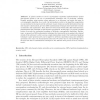Free Online Productivity Tools
i2Speak
i2Symbol
i2OCR
iTex2Img
iWeb2Print
iWeb2Shot
i2Type
iPdf2Split
iPdf2Merge
i2Bopomofo
i2Arabic
i2Style
i2Image
i2PDF
iLatex2Rtf
Sci2ools
131
Voted
SACRYPT
2004
Springer
2004
Springer
Provably Secure Masking of AES
A general method to secure cryptographic algorithm implementations against side-channel attacks is the use of randomization techniques and, in particular, masking. Roughly speaking, using random values unknown to an adversary one masks the input to a cryptographic algorithm. As a result, the intermediate results in the algorithm computation are uncorrelated to the input and the adversary cannot obtain any useful information from the side-channel. Unfortunately, previous AES randomization techniques have based their security on heuristics and experiments. Thus, flaws have been found which make AES randomized implementations still vulnerable to side-channel cryptanalysis. In this paper, we provide a formal notion of security for randomized maskings of arbitrary cryptographic algorithms. Furthermore, we present an AES randomization technique that is provably secure against side-channel attacks if the adversary is able to access a single intermediate result. Our randomized masking techniq...
Related Content
| Added | 02 Jul 2010 |
| Updated | 02 Jul 2010 |
| Type | Conference |
| Year | 2004 |
| Where | SACRYPT |
| Authors | Johannes Blömer, Jorge Guajardo, Volker Krummel |
Comments (0)

